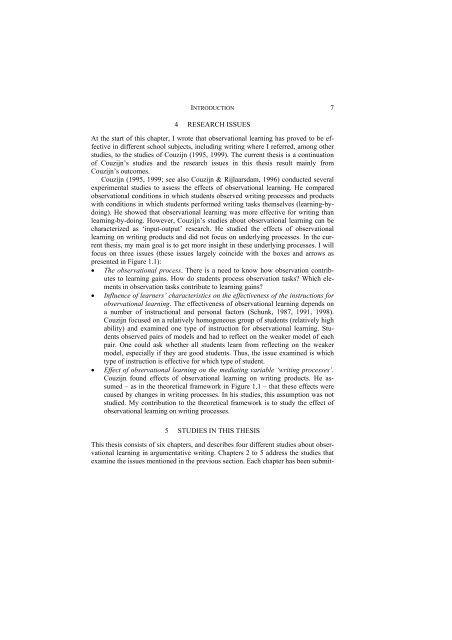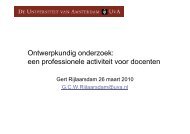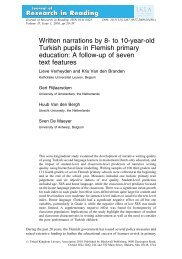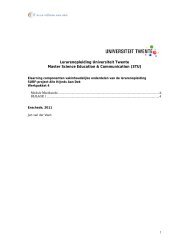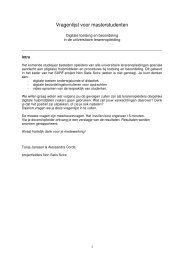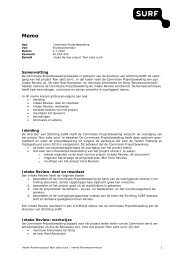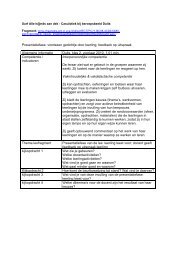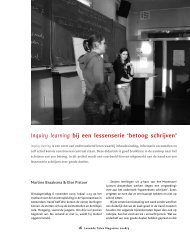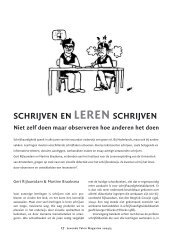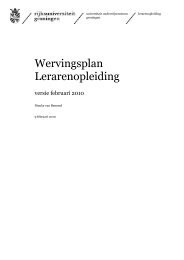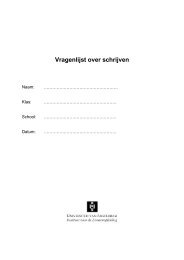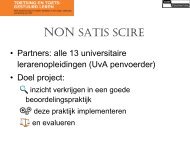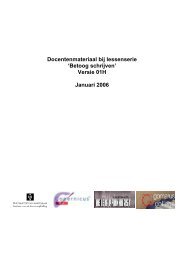OBSERVATIONAL LEARNING IN ARGUMENTATIVE WRITING
OBSERVATIONAL LEARNING IN ARGUMENTATIVE WRITING
OBSERVATIONAL LEARNING IN ARGUMENTATIVE WRITING
Create successful ePaper yourself
Turn your PDF publications into a flip-book with our unique Google optimized e-Paper software.
<strong>IN</strong>TRODUCTION 7<br />
4 RESEARCH ISSUES<br />
At the start of this chapter, I wrote that observational learning has proved to be effective<br />
in different school subjects, including writing where I referred, among other<br />
studies, to the studies of Couzijn (1995, 1999). The current thesis is a continuation<br />
of Couzijn’s studies and the research issues in this thesis result mainly from<br />
Couzijn’s outcomes.<br />
Couzijn (1995, 1999; see also Couzijn & Rijlaarsdam, 1996) conducted several<br />
experimental studies to assess the effects of observational learning. He compared<br />
observational conditions in which students observed writing processes and products<br />
with conditions in which students performed writing tasks themselves (learning-bydoing).<br />
He showed that observational learning was more effective for writing than<br />
learning-by-doing. However, Couzijn’s studies about observational learning can be<br />
characterized as ‘input-output’ research. He studied the effects of observational<br />
learning on writing products and did not focus on underlying processes. In the current<br />
thesis, my main goal is to get more insight in these underlying processes. I will<br />
focus on three issues (these issues largely coincide with the boxes and arrows as<br />
presented in Figure 1.1):<br />
• The observational process. There is a need to know how observation contributes<br />
to learning gains. How do students process observation tasks? Which elements<br />
in observation tasks contribute to learning gains?<br />
• Influence of learners’ characteristics on the effectiveness of the instructions for<br />
observational learning. The effectiveness of observational learning depends on<br />
a number of instructional and personal factors (Schunk, 1987, 1991, 1998).<br />
Couzijn focused on a relatively homogeneous group of students (relatively high<br />
ability) and examined one type of instruction for observational learning. Students<br />
observed pairs of models and had to reflect on the weaker model of each<br />
pair. One could ask whether all students learn from reflecting on the weaker<br />
model, especially if they are good students. Thus, the issue examined is which<br />
type of instruction is effective for which type of student.<br />
• Effect of observational learning on the mediating variable ‘writing processes’.<br />
Couzijn found effects of observational learning on writing products. He assumed<br />
– as in the theoretical framework in Figure 1.1 – that these effects were<br />
caused by changes in writing processes. In his studies, this assumption was not<br />
studied. My contribution to the theoretical framework is to study the effect of<br />
observational learning on writing processes.<br />
5 STUDIES <strong>IN</strong> THIS THESIS<br />
This thesis consists of six chapters, and describes four different studies about observational<br />
learning in argumentative writing. Chapters 2 to 5 address the studies that<br />
examine the issues mentioned in the previous section. Each chapter has been submit-


